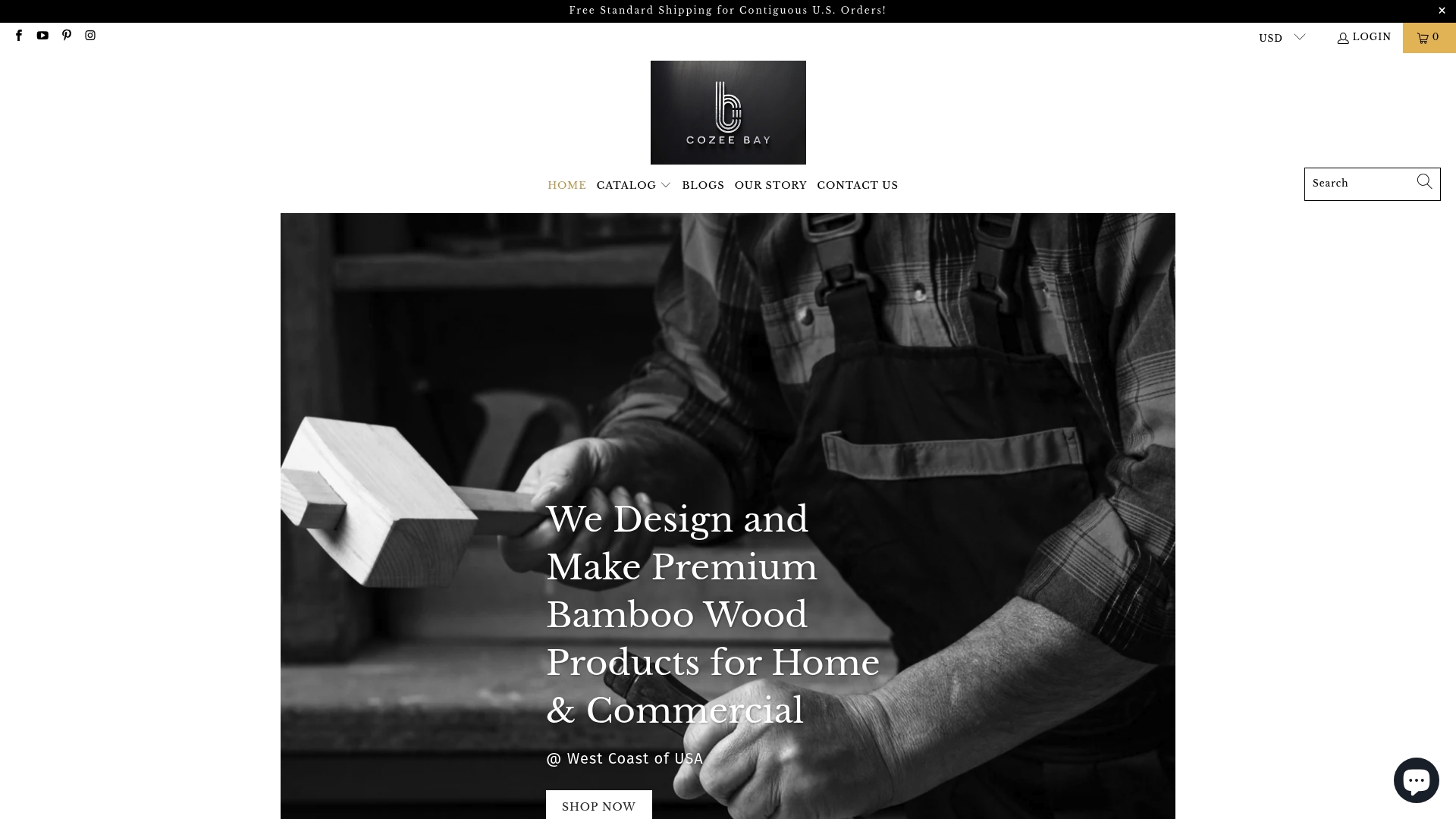Your Cart is Empty
Free Standard Shipping for Contiguous U.S. Orders!
Free Standard Shipping for Contiguous U.S. Orders!
Catalog

Eco-Friendly Bamboo Explained: Sustainability and Uses
November 10, 2025 6 min read
Bamboo is not only beautiful but also one of the fastest growing plants on Earth, with some species reaching up to 3 feet of growth in a single day. This natural powerhouse stands out as a clear solution for eco-conscious shoppers and businesses worried about deforestation and environmental damage. Choosing bamboo means embracing a material with outstanding strength, renewability, and positive environmental impact, supported by both science and real-world success stories.
Table of Contents
- Defining Eco-Friendly Bamboo Properties
- Bamboo Growth, Harvesting, And Sustainability
- Applications of Bamboo in Home and Business
- Comparing Bamboo With Traditional Wood Products
- Certifications, Safety, And Eco Claims
Key Takeaways
| Point | Details |
|---|---|
| Sustainable Material | Bamboo’s rapid growth, natural biodegradability, and ability to thrive without pesticides make it a premier eco-friendly resource. |
| Versatility in Applications | Bamboo is suitable for various uses, including construction, textiles, and renewable energy, providing sustainable alternatives across industries. |
| Advantages Over Traditional Wood | Bamboo’s faster growth cycle and superior strength-to-weight ratio contribute to reduced environmental impact compared to conventional timber products. |
| Importance of Certifications | Third-party certifications ensure the sustainability and safety of bamboo products, validating their eco-friendly claims for consumers. |
Defining Eco-Friendly Bamboo Properties
Bamboo represents a remarkable sustainable material with extraordinary environmental characteristics that set it apart from traditional resources. Rapid growth and exceptional regenerative capabilities make bamboo a standout choice for eco-conscious consumers and industries seeking responsible alternatives. According to MDPI, bamboo offers a remarkable combination of properties including a high strength-to-weight ratio and natural pest resistance.
The environmental advantages of bamboo extend far beyond its impressive growth rate. Academic research highlights bamboo’s extensive root system as a critical factor in soil stabilization and erosion control. This unique characteristic transforms bamboo from merely a material into an active environmental restoration tool.
Key eco-friendly properties of bamboo include:
- Extremely fast growth cycle (some species grow up to 3 feet per day)
- Natural biodegradability
- Low water consumption compared to traditional timber
- Ability to grow without pesticides or chemical interventions
- Carbon sequestration potential
Moreover, bamboo’s versatility allows it to thrive in diverse ecosystems, making it a globally accessible sustainable resource. Understanding Why Bamboo is Sustainable for Your Home provides deeper insights into how this remarkable plant can transform our approach to sustainable living. By choosing bamboo, consumers make a direct positive impact on environmental conservation and resource management.
Bamboo Growth, Harvesting, And Sustainability
Bamboo represents an extraordinary agricultural resource with remarkable sustainable growth characteristics that differentiate it from traditional timber crops. Rapid regeneration and efficient cultivation methods make bamboo a premier choice for environmentally conscious industries and consumers. According to MDPI, bamboo’s ability to regenerate quickly ensures minimal environmental disruption while providing a consistent renewable resource.
MDPI research highlights that sustainable bamboo harvesting involves strategic selection of mature culms and techniques that promote continuous growth. This approach ensures long-term ecological balance and prevents overexploitation. Proper harvesting techniques are critical to maintaining bamboo’s sustainability and preventing potential environmental damage.
Key sustainable growth and harvesting principles include:
- Selective cutting of mature culms
- Maintaining root systems for rapid regeneration
- Avoiding complete clearing of bamboo groves
- Implementing rotational harvesting strategies
- Preserving biodiversity in bamboo ecosystems
Understanding the Eco Impact of Bamboo in Sustainable Living provides deeper insights into how strategic bamboo management supports environmental conservation. By adopting responsible cultivation practices, we can transform bamboo from a simple agricultural product into a powerful tool for ecological restoration and sustainable resource management.

Applications of Bamboo in Home and Business
Bamboo has emerged as a revolutionary material with extraordinary versatility across residential and commercial applications. MDPI research reveals that bamboo’s potential spans multiple industries, offering eco-friendly alternatives in construction, furniture manufacturing, textiles, and paper production. This remarkable plant transforms traditional material usage by providing sustainable solutions that balance performance with environmental responsibility.
Beyond traditional applications, bamboo demonstrates remarkable potential in renewable energy sectors. Academic research highlights its potential as a biomass fuel source, contributing to sustainable energy initiatives. The material’s adaptability makes it an exceptional choice for forward-thinking businesses and environmentally conscious homeowners seeking innovative solutions.
Key applications of bamboo include:
- Home decor and furniture manufacturing
- Sustainable building materials
- Textile and clothing production
- Kitchen and bathroom accessories
- Renewable energy biomass
- Packaging and disposable products
- Landscaping and garden design
7 Top Uses for Bamboo in Homes You Need to Know provides an extensive exploration of how this extraordinary material can transform living spaces. From kitchen organizers to decorative elements, bamboo offers a perfect blend of functionality, aesthetic appeal, and environmental stewardship that meets the diverse needs of modern homes and businesses.
Comparing Bamboo With Traditional Wood Products
Structural performance and environmental sustainability set bamboo apart from traditional wood products in remarkable ways. MDPI research reveals that bamboo offers a superior strength-to-weight ratio compared to conventional timber, making it an exceptional material for construction and manufacturing. This unique characteristic means bamboo can provide comparable structural integrity while requiring significantly less material volume than traditional wood sources.
The environmental advantages of bamboo extend far beyond its mechanical properties. While traditional wood requires decades to mature, bamboo grows exponentially faster, with some species reaching full maturity in just 3-5 years compared to 20-50 years for hardwood trees. This rapid growth cycle translates to more sustainable resource utilization, reduced deforestation, and a dramatically lower carbon footprint for industries relying on wood-based materials.
Key comparative advantages of bamboo include:
- Faster growth and regeneration cycles
- Higher strength-to-weight ratio
- Lower environmental impact
- More extensive root system preventing soil erosion
- Natural pest resistance
- Reduced water consumption during cultivation
- Greater carbon sequestration potential
Complete Guide to Bamboo vs Traditional Wood provides an in-depth exploration of how this extraordinary material challenges conventional wood products. By choosing bamboo, consumers and industries can make a meaningful contribution to sustainable resource management while enjoying a material that meets or exceeds traditional wood’s performance standards.
Certifications, Safety, and Eco Claims
Third-party certifications play a critical role in validating the sustainability and safety of bamboo products for environmentally conscious consumers. MDPI research highlights that certifications like the Forest Stewardship Council (FSC) provide essential verification of environmental and social standards in bamboo production. These rigorous certification processes ensure that bamboo products meet strict guidelines for sustainable sourcing, manufacturing, and ecological responsibility.
Academic research underscores the importance of comprehensive safety testing for bamboo products. Extensive evaluations cover structural integrity, chemical treatment processes, and compliance with industry regulations. This multilayered approach guarantees that eco-friendly claims are substantiated through scientific testing and independent verification.
Key aspects of bamboo product certification include:
- Forest Stewardship Council (FSC) standards
- Comprehensive structural integrity testing
- Chemical safety evaluations
- Sustainable manufacturing process verification
- Supply chain transparency
- Environmental impact assessments
- Social responsibility criteria
Understanding the Benefits of Sustainable Home Products provides additional insights into how certification processes protect consumers and support sustainable manufacturing practices. By prioritizing certified bamboo products, consumers can confidently choose materials that deliver both environmental benefits and proven safety standards.
Discover Sustainable Style and Function with Bamboo Products from Cozee Bay
The article highlights bamboo as a powerful sustainable material with fast growth and eco-friendly properties that make it essential for responsible living and business choices. If you want to bring the benefits of bamboo into your home or commercial space while reducing environmental impact consider the elegant and practical bamboo paper towel dispensers available at Cozee Bay. These dispensers combine durability, sleek design, and the natural strength of bamboo to provide an eco-conscious solution that fits perfectly with your sustainability goals.

Explore our curated collection of Bamboo Paper Towel Dispensers and complement them with handy Food Bag Storage Organizers to elevate your space with environmentally responsible products. Take action now to reduce waste and embrace the natural benefits of bamboo by visiting Cozee Bay. Make the switch to sustainable living today with products that support the planet and your lifestyle.
Frequently Asked Questions
What are the key eco-friendly properties of bamboo?
Bamboo offers several eco-friendly properties, including extremely fast growth cycles, natural biodegradability, low water consumption compared to traditional timber, the ability to grow without pesticides, and significant carbon sequestration potential.
How does bamboo compare to traditional wood products in terms of sustainability?
Bamboo is more sustainable than traditional wood due to its faster growth and regeneration cycles, higher strength-to-weight ratio, lower environmental impact, and reduced water consumption during cultivation, making it an excellent alternative to hardwood lumber.
What are some common applications of bamboo in home and business settings?
Bamboo is versatile and is used in various applications, including home decor, furniture manufacturing, sustainable building materials, textiles, kitchen accessories, renewable energy biomass, and landscaping products.
Why are certifications important for bamboo products?
Certifications, like the Forest Stewardship Council (FSC), validate the sustainability and safety of bamboo products, ensuring they meet stringent environmental and social standards, structural integrity, and chemical safety evaluations.
Recommended
Leave a comment
Comments will be approved before showing up.
Subscribe
Sign up to get the latest on sales, new releases and more …

